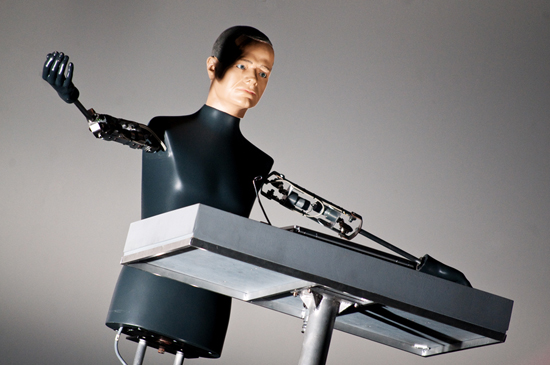In November 1974, the year of the release of Kraftwerk’s ‘Autobahn’, the Arecibo radio telescope sent a message to the M13 star cluster in the Hercules constellation, 27.4 light years away. The message was made up of 1679 binary digits which would, if deciphered, reveal an image of a human, the graphic structure of DNA, and a plan of our solar system. It will take tens of thousands of years for the greeting to arrive in whatever alien ears might be out there. As Kraftwerk play on this Croatian waterfront (the man-made Jarun rowing lake, which feels apt) and their sound (pristine and crisp) rolls from the stage, across the water and towards the city of Zagreb, and beyond, the wooded slopes of Medvednica, it’s hard not to imagine their music as some timeless and immortal means of communication with our descendants, or future worlds.
As was the case with Throbbing Gristle at Heaven last week, when it comes to live performance, it’s technology that has had to catch up with Kraftwerk. As the (now departed) Karl Bartos told The Quietus recently, "the binary alphabet has changed so many things and made it so easy to play live. Which really is a wonder."
Kraftwerk were born of the future – and they still sound like it. Theirs was music, stamped ‘made in Germany’, that aggressively looked ahead when the rest of the world was already slipping into myopic 60s nostalgia. In the years since, it’s been the legacy of Kraftwerk that has created every truly progressive form of music. Their family tree spreads its branches wide, while that of the more canonical rock groups increasingly resembles a leafless pine, lonely and denuded by acid rain, pointing a solitary finger into a barren sky. Whereas a reformed Blur – from the latter family – lead boozy singalongs in parks and fields, Kraftwerk collaborate with the British cycling team to perform alongside Steve Reich in a velodrome.
Theirs is the space between the human, the industrial and the natural: the Tito era Slejeme transmission tower lit by the sunset on the mountains past Zagreb, the point where vast pylons gracefully drop their wires into the huge, humming power stations next to the Lea Navigation on the edge of Hackney Marsh. Yet they tug the heartstrings too. There’s something childlike and pure about the one finger synth refrain of ‘Radioactivity’ and ‘Computer Love’, as if they were being tapped out by a toddler on its xylophone. This is still naive art, just performed with the latest technologies. It is a very human, and very simple wonderment at the potential and portent of technology – what is ‘Tour De France’ if not, at its essential level, an exploration of the human fascination with that most ancient of our inventions, the wheel? And, let us not forget, they understand pop, and as thousands of dancing, screaming Croatians agree, are a hell of a lot of fun.
Ralph Hutter might be the only remaining original member – the other three are replaced by a man whose face I can’t even recall, a short old chap who resembles the actor Ian Holm, and a hotty on the far right, but even without him this music need never end. Be they the automated robots up there on stage, or four more persons unsmiling in well cut leather jackets or neon-lit body suits, it doesn’t matter. Kraftwerk’s music strips out the personal – they’re a group who seemingly have shed members over the years due to difficult interpersonal relationships, none of which have impacted on their music. It’s a notable contrast to what happens when rock bands, so reliant on each egotistical cog, fracture or implode.
When it comes to Kraftwerk, there’s no need for back story, no need for context, no need even for any of the original technicians to still be involved. If he decides to hang up his chin mic, one hopes Hutter might create a fully automated Kraftwerk, for these transmissions still have time to run before they reach obsolescence, if, indeed, they ever will. The man machine must keep marching ever forward.
Click the robot below for a gallery of Kraftwerk pictures from the Zagreb inMusic Festival



